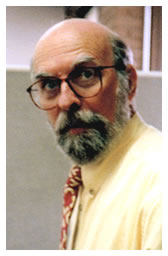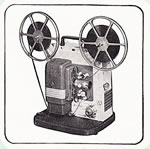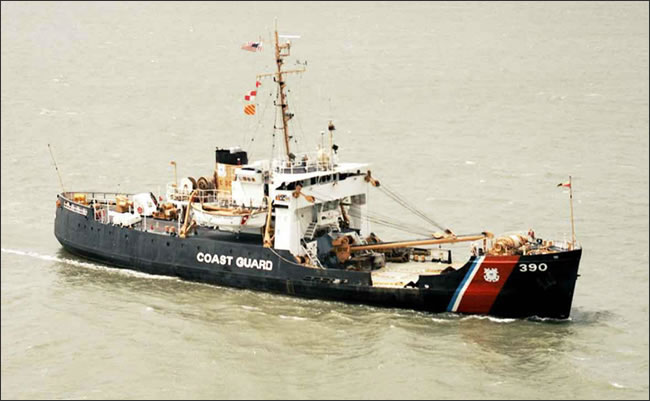
From the fevered
recollections
of Reno Bailey


From the fevered
recollections
of Reno Bailey
Did I ever tell you about the time Earl Owensby and I went into the movie business?
Back about 1950, when summer meant going barefoot and boys had long idle days to get into all sorts of mischief, Earl Owensby and I cleaned out a space in the old barn behind my house at 59 N. Main and made it into a “theater.” In the war years it had housed Fred Swing’s chickens, and the odor of poultry still lingered on into the fifties. But you work with what you have.
 We hung blankets over the windows, tacked a bedsheet on the wall for a screen and “installed” the two home movie projectors we had gotten for Christmas. Our vast inventory of silent films (none over five minutes long) included a documentary called Cavalcade of Presidents, a shortened version of a Little Rascals short, a fragment of a Tex Ritter western, and a few other less-appealing titles. (You could buy these little gems at the drugstore for about a dollar.)
We hung blankets over the windows, tacked a bedsheet on the wall for a screen and “installed” the two home movie projectors we had gotten for Christmas. Our vast inventory of silent films (none over five minutes long) included a documentary called Cavalcade of Presidents, a shortened version of a Little Rascals short, a fragment of a Tex Ritter western, and a few other less-appealing titles. (You could buy these little gems at the drugstore for about a dollar.)
By word of mouth, our enterprise became known to a fair-sized contingent of little Cliffsiders, eager, despite the smell, to attend our matinees— for only five cents.
A few days passed without incident, but one afternoon we looked down the cinder-track driveway and saw the manager of Cliffside’s real theater, Bobo Harrill, and his trusted projectionist, Paul Gosey, approaching our cinematic outpost. We were busted. He told us in no uncertain terms that, inasmuch as there was room for only one theater in town, that one was going to be his. Moreover, running a business requires a license, and if we had one he would like to see it.
Curses, foiled again. It was just as well, though, for we had pretty much run through our library, and our patrons had just about depleted their meager allowances.
Frankly, it was a relief to be out from under the burdens of our piddling undertaking. But it was an auspicious beginning: Earl went on to make millions in the movie business. I went into broadcasting and continued to collect nickels.
![]()
Did I ever tell you about my summer vacation in the Arctic, the land of polar bears and the midnight sun?
 |
The U.S. Coast Guard Cutter Blackhaw |
In the '50s you couldn't turn on the radio without hearing a Pall Mall (pronounced Pell Mell) cigarette commercial. All of them ended with the tagline "Buy Pell Mell, famous cigarettes, outstanding! And they are mild!"
July 1957 was the start of the International Geophysical Year (IGY) during which scientists from all over the world conducted reseach, especially in the arctic regions.
The Navy dispatched a task force north to the Artic Ocean to assist in the IGY operation. I was a radioman on the Coast Guard cutter Blackhaw, in Honolulu. Our little ship, a buoy tender (with a reinforced hull for light ice-breaking), was assigned to go along, not for anything particularly significant, but to keep ice away from a big important Navy communications vessel.
The Artic Ocean at that time of year was easily navigable, so all we had to do was to nudge aside any large floes that might get in the Navy ship's way. But, for some reason the big ship, although bristling with antennae, could not communicate with naval headquarters on some critical frequencies. So, it fell to the little Blackhaw with our six radio operators (two to a watch) to monitor those frequencies and receive and relay a heavy load of "traffic" to a ship with probably dozens of operators. This went on for about a month.
After the mission was over and we were about to head home, the captain called for a crew meeting on the mess deck. He ran over all the highlights of the voyage, how our efforts had been a small but important part in advancing scientific progress in untold ways, etc, etc.
Then he told about how we, the boys in the radio shack, had saved the U.S. Navy's butt. He concluded this bit of praise by saying, "Blackhaw radiomen are outstanding!"
As if rehearsed, and sounding just like that announcer, I heard myself blurt out these words: "And they are mild!"
The crew broke up, and so did the meeting.
![]()
Did I ever tell you I was once, in my former youth, an honest-to-God TV newscaster?
Oh, yes. Sit right here, we'll talk.
Back in the day, UNC's television state-wide network out of Chapel Hill had a half-hour newscast, weekdays at noon.
One day in late summer of 1961 they announced there would be auditions for the newscaster position. I thought to myself, “If not me, who? If not now, when?”
I have no idea how many auditioned besides me. Probably nobody, for I actually won.
All along I figured it would be a team effort. You know, like Walter, Chet and David had, a producer and editor and such. But that was not to be. I would have to do everything except direct and run camera. My resources were nearly none. No film, no slides, no art department, nothing to cut away to. Straight on, for the entire newscast—and no 'prompter.
I would arrive at the station about 10:30 a.m., rip stories off the teletype machine in a little closet upstairs, put them in order, edit the stories, make a copy for the director, straighten my narrow tie, and have at it.
There was an old rear-screen projector in the studio that heretofore was used to project generic campus scenes. Putting my creative heads together, I thought of a way to liven up the ol' programs. Every couple of weeks I would drive over to the Burlington Times-News and scrounge around in their waste baskets for AP wire-photos of people currently in the news, like Congolese strongman Joseph Mobutu, Kenya's Jomo Kenyatta and other personages of note. Then I'd return to Chapel Hill, make slides of the photos, and have something besides my upper torso to illustrate some stories.
Then on February 20, 1962, astronaut John Glenn was about to be sent into orbit. There was nothing on the wire but updates on the Glenn shoot. So it was one big story to lead...then what? From somewhere I found three or four runners to race upstairs, rip the latest update off the wire, rush back to the studio and slide the copy onto the desk. By the time I had read it, another update would be available. Worked like a charm, except, with Glenn still up there in space, we had to end the program. To this day I regret any disappointment felt by our dozens of viewers.
I don't remember being paid anything for my valuable service. But once my mother was visiting, and I wanted her to see her son on television. I put the TV on Channel 13, left her on the sofa, and went to the studio. When I returned a couple hours later, I said, “Well, Mama, how was the newcast? What do you think?”
“Oh, Son,” she exulted, “It was so good. I could understand every word!”
Payment enough.
![]()